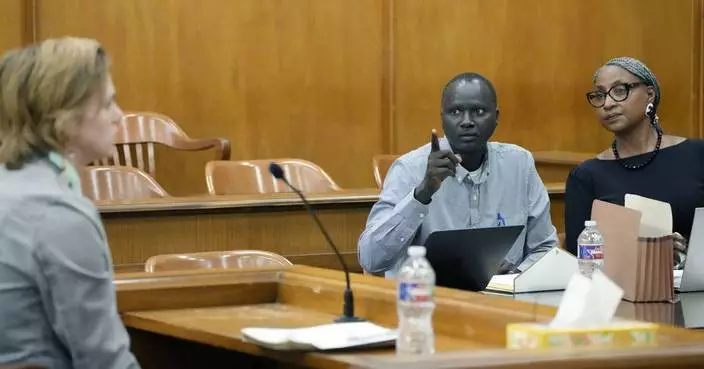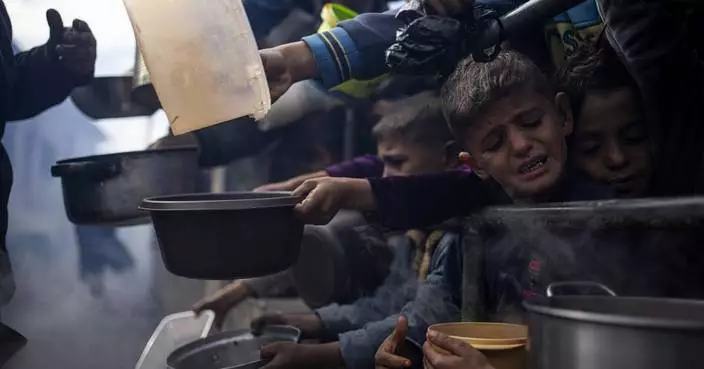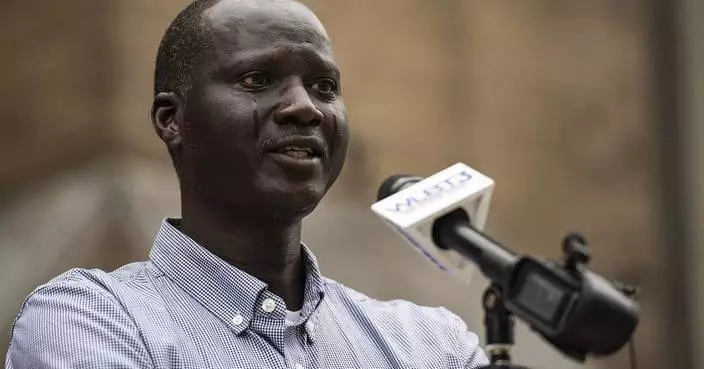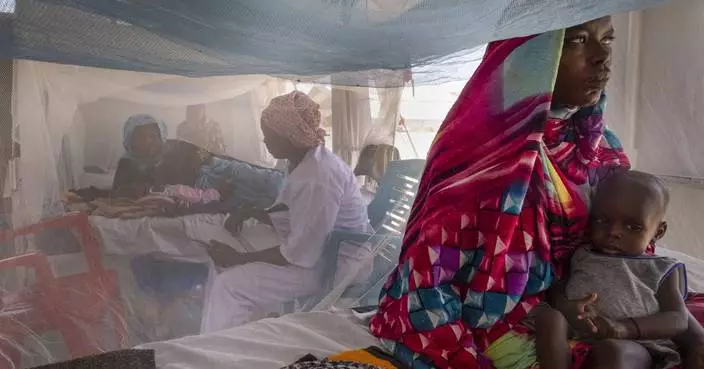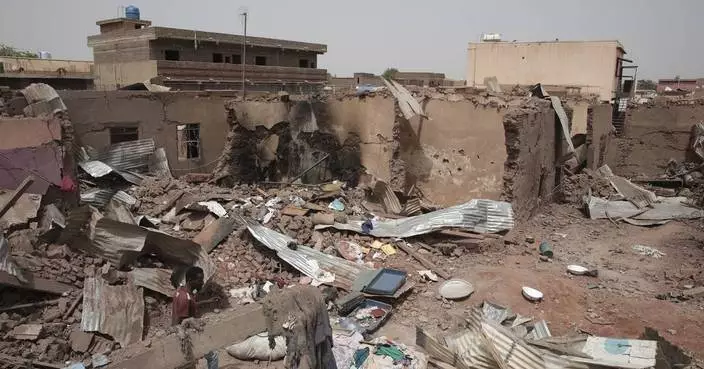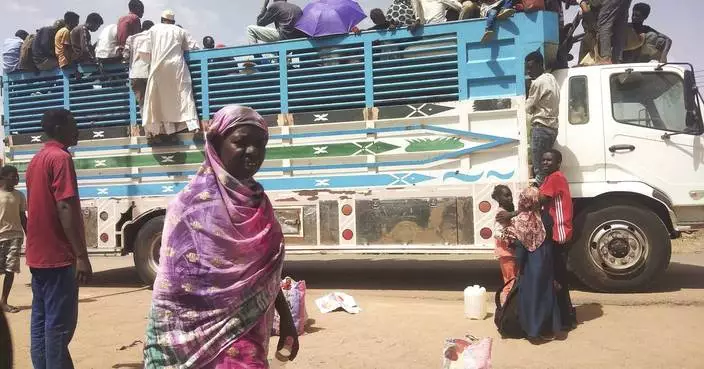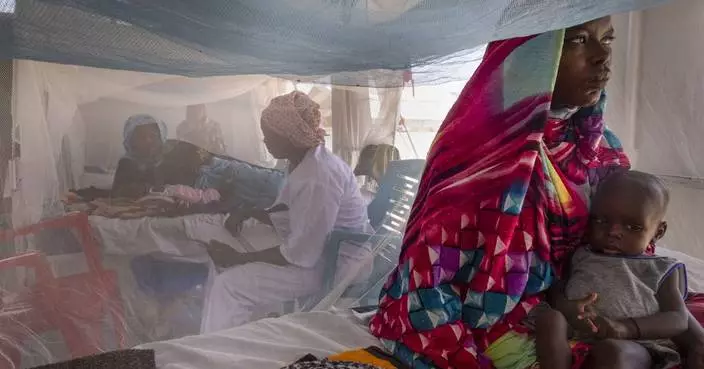Sudan's pro-democracy movement signed a final power-sharing agreement with the ruling military council on Saturday at a ceremony in the capital, Khartoum.
The deal paves the way for a transition to civilian-led government following the military overthrow of President Omar al-Bashir in April.
Click to Gallery
Sudan's pro-democracy movement signed a final power-sharing agreement with the ruling military council on Saturday at a ceremony in the capital, Khartoum.
Ethiopia and the African Union co-led mediation efforts between the military and protesters, and many regional leaders and international envoys attended Saturday's ceremony, including Ethiopian Prime Minister Abiy Ahmed. Attendees in the Friendship Hall where the ceremony took place received Ahmed with cheering chants.
Protest leader Mohammed Naji al-Asam said they have ushered a "new page" in Sudan's history after three decades of "repression and corruption."
"Today is the day of transition to civilian rule.... The next stage will be a test for us, without exclusion. We will open the door so all people can participate," said al-Mahdi who led Sudan's last freely elected government before the Islamists-backed military coup in 1989.
The FDFC has nominated a well-known economist, Abdalla Hamdok, to lead the government during the transition. He served as the the deputy executive secretary of the United Nations Economic Commission for Africa since November 2011, and has yet to be confirmed by the sovereign council. The council's members are to be announced on Sunday, after which the ruling military council will immediately be disbanded.
The military overthrew al-Bashir following months of protests against his three-decade-long authoritarian rule. The protesters then remained in the streets, demanding a rapid transition to civilian leadership.
The signing capped weeks of tortuous negotiations between the military and protest leaders. Earlier this month, the two sides initialed a constitutional document in the wake of international pressure and amid growing concerns the political crisis could ignite civil war.

Sudanese pro-democracy supporters celebrate a final power-sharing agreement with the ruling military council Saturday, Aug 17, 2019, in the capital, Khartoum. The deal paves the way for a transition to civilian-led government following the overthrow of President Omar al-Bashir in April. (AP Photo)
Ethiopia and the African Union co-led mediation efforts between the military and protesters, and many regional leaders and international envoys attended Saturday's ceremony, including Ethiopian Prime Minister Abiy Ahmed. Attendees in the Friendship Hall where the ceremony took place received Ahmed with cheering chants.
Sudanese celebrated in Khartoum and elsewhere across the country. Videos posted online showed people celebrating in the streets in Darfur and the eastern province of Kassala.
Railway workers and other protesters had traveled to the capital Friday by train from Atbara, the northern transport hub where the uprising began in December.
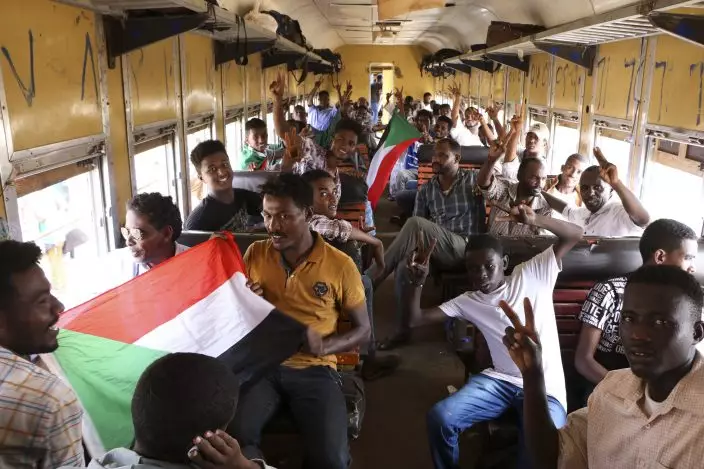
Sudanese pro-democracy supporters celebrate a final power-sharing agreement with the ruling military council Saturday, Aug 17, 2019, in the capital, Khartoum. The deal paves the way for a transition to civilian-led government following the overthrow of President Omar al-Bashir in April. (AP Photo)
Protest leader Mohammed Naji al-Asam said they have ushered a "new page" in Sudan's history after three decades of "repression and corruption."
He said the transitional government would prioritize a "fair and comprehensive peace" with rebels across Sudan.
Former Prime Minister Sadiq al-Mahdi, the leader of the opposition Umma party, said the deal was a "first step" in the democratic change till holding "fair" elections.
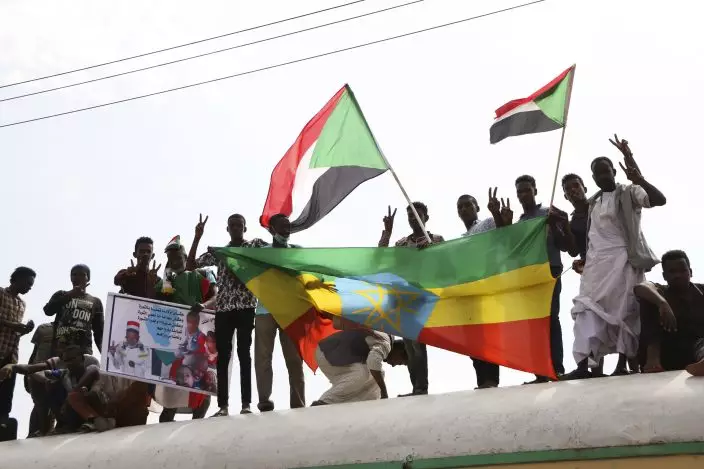
Sudanese pro-democracy supporters celebrate a final power-sharing agreement with the ruling military council Saturday, Aug 17, 2019, in the capital, Khartoum. The deal paves the way for a transition to civilian-led government following the overthrow of President Omar al-Bashir in April. (AP Photo)
"Today is the day of transition to civilian rule.... The next stage will be a test for us, without exclusion. We will open the door so all people can participate," said al-Mahdi who led Sudan's last freely elected government before the Islamists-backed military coup in 1989.
The power-sharing deal creates a joint military and civilian sovereign council to rule for a little over three years until elections can be held. A military leader would head the 11-member council for the first 21 months, followed by a civilian leader for the next 18.
The agreement would also establish a Cabinet appointed by the activists, as well as a legislative body to be assembled within three months. The protest coalition is to have a majority in that body, as nominated by the Forces for Declaration of Freedom, a coalition of opposition parties and movements representing the protesters.
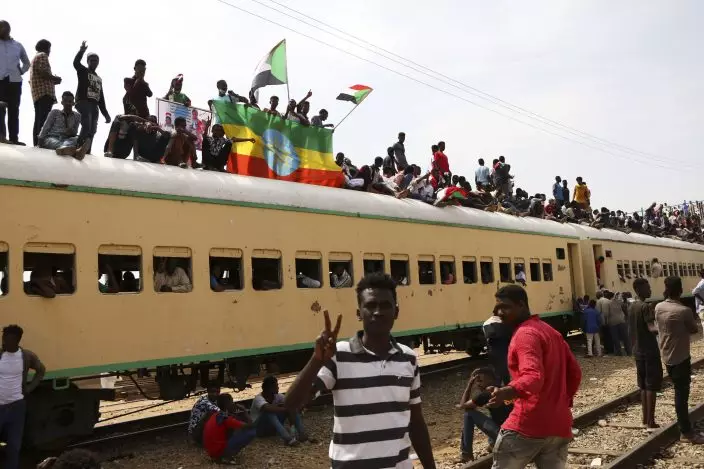
Sudanese pro-democracy supporters celebrate a final power-sharing agreement with the ruling military council Saturday, Aug 17, 2019, in the capital, Khartoum. The deal paves the way for a transition to civilian-led government following the overthrow of President Omar al-Bashir in April. (AP Photo)
The FDFC has nominated a well-known economist, Abdalla Hamdok, to lead the government during the transition. He served as the the deputy executive secretary of the United Nations Economic Commission for Africa since November 2011, and has yet to be confirmed by the sovereign council. The council's members are to be announced on Sunday, after which the ruling military council will immediately be disbanded.
The deal has been criticized by the Sudan Revolutionary Front, an alliance of the largest rebel groups in Darfur. The rebels have stressed to protester leaders that the agreement did not include "basic principles" to achieve peace in Sudan. The deal calls for the government to reach a peace agreement with the rebels within six months.
The rebel alliance, which is part of the FDFC, wanted to include a peace document agreed with the protest movement into the power-sharing deal. The rebel leaders have engaged in talks with other protest leaders to settle the disputed points.

Sudanese pro-democracy supporters celebrate a final power-sharing agreement with the ruling military council Saturday, Aug 17, 2019, in the capital, Khartoum. The deal paves the way for a transition to civilian-led government following the overthrow of President Omar al-Bashir in April. (AP Photo)
The military overthrew al-Bashir following months of protests against his three-decade-long authoritarian rule. The protesters then remained in the streets, demanding a rapid transition to civilian leadership.
The two sides came under renewed pressure to reach an accord after security forces opened fire on student protesters in the city of Obeid on Aug. 1, leaving six people dead. At least nine troops from the paramilitary Rapid Support forces were arrested over the killings.
In June, security forces violently dispersed the protesters' main sit-in outside the military headquarters in Khartoum, killing dozens of people and plunging the fragile transition into crisis. The deal includes the establishment of an independent investigation into the crackdown.
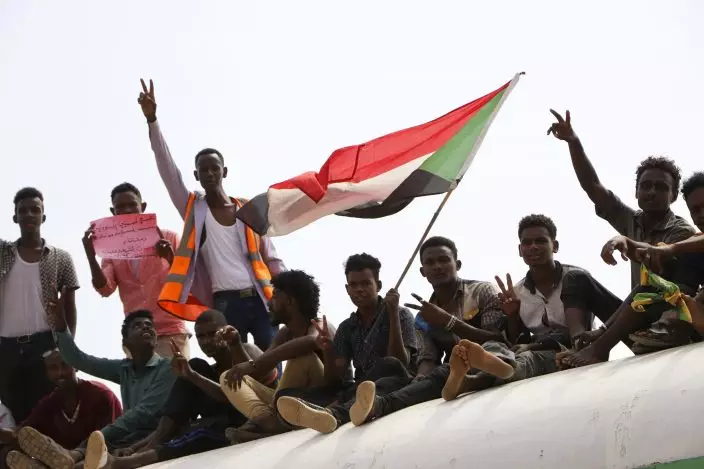
Sudanese pro-democracy supporters celebrate a final power-sharing agreement with the ruling military council Saturday, Aug 17, 2019, in the capital, Khartoum. The deal paves the way for a transition to civilian-led government following the overthrow of President Omar al-Bashir in April. (AP Photo)
UNITED NATIONS (AP) — The United Nations food agency warned Sudan’s warring parties Friday that there is a serious risk of widespread starvation and death in Darfur and elsewhere in Sudan if they don’t allow humanitarian aid into the vast western region.
Leni Kinzli, the World Food Program’s regional spokesperson, said at least 1.7 million people in Darfur were experiencing emergency levels of hunger in December, and the number “is expected to be much higher today.”
“Our calls for humanitarian access to conflict hotspots in Sudan have never been more critical,” she told a virtual U.N. press conference from Nairobi.
Sudan plunged into chaos in mid-April 2023, when long-simmering tensions between its military led by Gen. Abdel Fattah Burhan, and the paramilitary Rapid Support Forces commanded by Mohammed Hamdan Dagalo, broke out into street battles in the capital, Khartoum. Fighting has spread to other parts of the country, especially urban areas and the Darfur region.
The paramilitary forces, known as the RSF, have gained control of most of Darfur and are besieging El Fasher, the only capital in Darfur they don’t hold, where some 500,000 civilians had taken refuge.
Kinzli said WFP’s partners on the ground report that the situation in El Fasher is “extremely dire” and it’s difficult for civilians wanting to flee the reported RSF bombings and shelling to leave.
She said the violence in El Fasher and surrounding North Darfur is exacerbating the critical humanitarian needs in the entire Darfur region, where crop production for staple cereals like wheat, sorghum and millet is 78% less than the five-year average.
On top of the impact of escalating violence, Kinzli said, “WFP is concerned that hunger will increase dramatically as the lean season between harvests sets in and people run out of food.” She said a farmer in El Fasher recently told her that her family had already run out of food stocks and is living day-to-day, an indication that the “lean season,” which usually starts in May, started earlier.
Kinzli said she received photos earlier Friday from colleagues on the ground of severely malnourished children in a camp for displaced people in Central Darfur, as well as older people “who have nothing left but skin and bones.”
“Recent reports from our partners indicate that 20 children have died in recent weeks of malnutrition in that IDP camp,” she said.
“People are resorting to consuming grass and peanut shells,” Kinzli said. “And if assistance doesn’t reach them soon, we risk witnessing widespread starvation and death in Darfur and across other conflict-affected areas in Sudan.”
Kinzli called for “a concerted diplomatic effort by the international community to push the warring parties to provide access and safety guarantees” for humanitarian staff and convoys.
“One year of this devastating conflict in Sudan has created an unprecedented hunger catastrophe and threatens to ignite the world's largest hunger crisis,” she warned. “With almost 28 million people facing food insecurity across Sudan, South Sudan and Chad, the conflict is spilling over and exacerbating the challenges that we've already been facing over the last year.”
In March, Sudanese authorities revoked WFP’s permission to deliver aid from neighboring Chad to West Darfur and Central Darfur from the town of Adre, saying that crossing had been used to transfer weapons to the RSF. Kinzli said restrictions from Sudanese authorities in Port Sudan are also preventing WFP from transporting aid via Adre.
Sudanese authorities approved the delivery of aid from the Chadian town of Tina to North Darfur, but Kinzli said WFP can no longer use that route for security reasons because it goes directly into besieged El Fasher.
On Thursday, gunmen in South Darfur killed two drivers for the International Committee of the Red Cross and injured three ICRC staff members. On Friday, U.N. humanitarian chief Martin Griffith called the killing of aid works “unconscionable.”
Kinzli said the fighting “and endless bureaucratic hurdles” have prevented WFP from delivering aid to over 700,000 people in Darfur ahead of the rainy season when many roads become impassable.
“WFP currently has 8,000 tons of food supplies ready to move in Chad, ready to transport, but is unable to do so because of these constraints,” she said.
“WFP urgently requires unrestricted access and security guarantees to deliver assistance,” she said. “And we must be able to use the Adre border crossing, and move assistance across front lines from Port Sudan in the east to Darfur so we can reach people in this desperate region.”

FILE - Sudanese Children suffering from malnutrition are treated at an MSF clinic in Metche Camp, Chad, near the Sudanese border, on April 6, 2024. The United Nations food agency warned Sudan’s warring parties Friday, May 4, that there is a serious risk of widespread starvation and death in Darfur and elsewhere in Sudan if they don’t allow humanitarian aid into the vast western region. (AP Photo/Patricia Simon, File)










